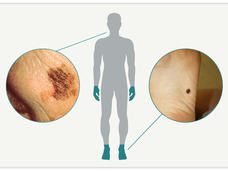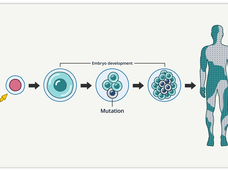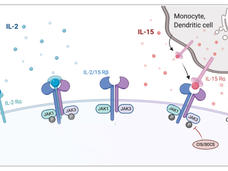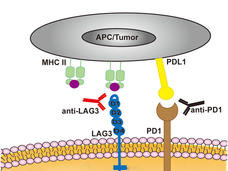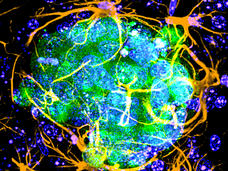April 2022 - Cancer Currents Blog
-
Body Location May Influence Fate of Cells with Cancer-Causing Mutations
Whether cells with cancer-related genetic changes will develop into tumors may partly depend on their location in the body, a new study finds. The study focused on a rare form of skin cancer, acral melanoma.
-
Embryos in the Womb Can Get Gene Mutations That Lead to Cancer in Adulthood
Mutations in cancer-related genes that start in embryos may be more common than once thought, a new study has shown. Finding out if a person has a mosaic mutation is important for their cancer care, according to the study leaders.
-
Screening for Many Cancers with One Test: Uncertainty Abounds
Progress has been made on developing noninvasive tests that may be able to find many cancers early. But, as NCI’s Dr. Phil Castle explains, there’s still much to learn about these multi-cancer early detection tests before they become widely used.
-
Identifying Safer Ways to Look for Recurrence after Testicular Cancer Surgery
After surgery for early-stage, low-risk testicular cancer, it’s safe to monitor for a recurrence using MRI scans or fewer CT scans than are currently used, according to results from a large clinical trial.
-
Implanted “Drug Factories” Deliver Cancer Treatment Directly to Tumors
Researchers have developed tiny “drug factories” that produce an immune-boosting molecule and can be implanted near tumors. The pinhead-sized beads eliminated tumors in mice with ovarian and colorectal cancer and will soon be tested in human studies.
-
Opdualag Becomes First FDA-Approved Immunotherapy to Target LAG-3
The immunotherapy treatment, which combines the LAG-3 inhibitor relatlimab and PD-1 inhibitor nivolumab, becomes the first new immune checkpoint inhibitor approved in 8 years. Both drugs are given to patients via a single infusion to treat advanced melanoma.
-
Alzheimer’s-Linked Protein May Help Melanoma Spread to Brain
Melanoma cells that travel to the brain produce their own amyloid beta, helping the cells survive and form metastases, a new study in mice shows. The Alzheimer’s-linked proteins appear to tamp down the brain’s immune response to the cancer cells.
